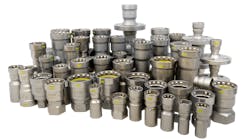Latest from Pipefitting
Sponsored
BY STEVE LAMB
Special to CONTRACTOR
AMERICA IS EXPERIENCING a skilled labor shortage, and predictions show it may get worse. A Construction Industry Institute study indicates that 75% of contractors are experiencing shortages - and the U.S. Department of Labor’s Bureau of Labor Statistics estimates that the construction industry will need to attract 240,000 workers each year, to replace those leaving the workforce or retiring, while still allowing for industry growth.
The retirement of older workers becomes a greater concern when one considers that today’s construction workforce is an aging one. The Bureau of Labor Statistics states that the average construction worker is 47 years old.
The industry needs more people entering the workforce to replenish the ranks - but it also must contend with a distinct marketing challenge. Many people, particularly younger workers, see skilled labor careers as menial and low paying. Plus, careers in construction face negative image perceptions. For example, when rating the 250 best work opportunities, the book, “Jobs Rated Almanac” (6th edition, 2002), ranked construction jobs at relatively low levels - heating/refrigeration mechanic appeared at No. 161, welder came in at No. 227 and construction worker finished at No. 247.
The Mechanical Contractors Association of America and its affiliate MCAs are fighting those negative perceptions. We want men and women everywhere to know that, in fact, careers in skilled labor can be exciting, challenging, high paying and rewarding, with plenty of potential for self-employment. Over the years, MCAA has helped to launch thousands of promising careers. Union-trained means more skilled and more productive. And when you’re in demand as a worker, you’re in command of your future.
We are spreading the good news about MCAA career opportunities through our recruitment techniques, informational campaigns and apprenticeship programs.
Our recruitment efforts start as early as the junior high and high school level. Teacher-training specialist Jerry Katz, in collaboration with various local MCAs, has initiated a science program for classrooms called Internal and Thermal Energy Matter in Motion instructional program. Katz, who also appears in the videos that accompany the lessons, developed this informative program. When the ITEMM lessons have been completed, an HVACR professional makes a classroom presentation on the practical applications of what students have learned. They receive information on careers in the HVACR industry as well.
Jack Weaver, executive director of MCA of the Carolinas, is working with science teachers in Forsyth County, N.C., who have expressed strong interest in teaching the ITEMM curriculum. His local MCA partners with the community at many different levels. The group received a charter from the MCAA for a student chapter at Western University in North Carolina, and it is aggressively recruiting top students. The MCA regional training center in Charleston, S.C., a state-of-the-art facility, is dedicated to training the leaders of tomorrow at the most advanced levels.
Here in the Chicago area, an exciting project is underway that will help bring more young people into the construction field. Industry leaders have come together to establish ACE Tech - the Architecture, Construction and Engineering Technical Charter High School. ACE Tech will provide a rigorous learning experience, which fully complies with Illinois education standards for a high school diploma. Students will develop the necessary proficiencies to enter the construction industry trade union training schools, architecture or engineering college programs, or technical training programs for careers in architecture, construction management or engineering.
The Chicago Public School System is considering an application for a five-year charter. Upon approval of the charter, ACE Tech plans to open its doors in Chicago, beginning the fall semester of 2004.
Union apprenticeship programs are the pride of our industry. Department of Labor records from 36 states show that union programs have enrolled 72% of construction apprentices since 1989, and they have enrolled almost three times as many minorities and more than four times as many women as non-union programs. And we are continually striving to improve those figures. Together, MCA Chicago and Local Union 597 launched the “Tomorrow Team” campaign to increase apprenticeship enrollment. This program was an aggressive image campaign addressing the issue of how skilled labor is perceived by young workers.
The “Tomorrow Team” features a comic book and CD in which four ordinary citizens team up to pursue exciting careers in the piping industry. Their story is told in a brightly illustrated comic-book style that readers of all ages can enjoy. The characters in this lively adventure are Supervisor Woman, Service Tech Dude, Pipe Fitter Chick and Contractor Man.
Most comic book characters have science in their lives - just look at Spiderman! The “Tomorrow Team” comic book shows that there is science in a career in the piping industry, and it can be fun and very rewarding.
Once students enter union-based apprenticeships, they have the opportunity to earn while they learn. Apprentices with Local Union 597, the largest pipefitter union in the country, begin earning $14 an hour while they learn, as opposed to many college students who often owe money from the moment they begin their schooling. The apprenticeship is a four-year program, and fourth-year students can earn more than $27 per hour, with benefits. Pipefitting apprentices can earn an associate’s degree by taking just three extra courses. A first-year pipefitter journeyman from Local Union 597 can make more than $60,000 annually working a standard 40-hour week.
Predictions may state that the skilled labor shortage will only get worse, but unions and their contractors are working to do something about the problem before it is too late. We want to make sure tomorrow’s builders are learning their skills today. Programs like ITEMM, ACE Tech and the “Tomorrow Team” give me high hopes for the future.
Steve Lamb is the executive vice president of the Mechanical Contractors Association of Chicago. He can be reached by phone at 312/384-1220 or via the Web at www.mca.org

